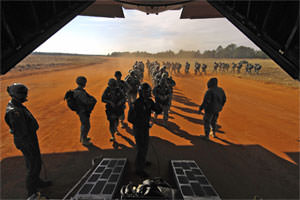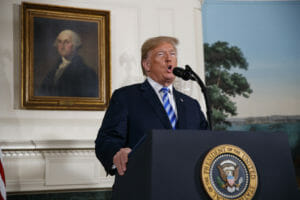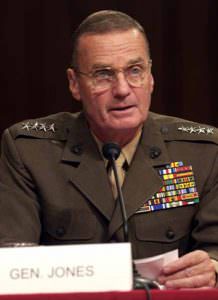The Road Out of Iraq Begins in Vietnam
Iraq is not Vietnam, yet there are parallels between the two wars. The American military dominated the battlefield in both conflicts, and yet America the nation emerged the loser in each. A "decent interval" is now needed for American troops to withdraw.
This article is the second part of a four-part series that explores policy options for President-elect Barack Obama regarding Iran, Iraq, Pakistan and Russia. The first article, “With Iran, Obama Needs More Carrot, Less Stick,” ran Nov. 13.
It has often been said that Iraq is not Vietnam and that any effort to compare the two wars is misguided and intellectually dishonest. While I would be the first to concur, one can never forget Carl von Clausewitz’s maxim that “war is an extension of politics, by other means.” As such, every war represents a model for all conflict, insofar as it represents not simply force-on-force military engagement, but, more important, military-political interaction which incorporates the domestic dynamic of the involved nations. Vietnam the war was not simply lost on the field of battle in Southeast Asia, just as Iraq the war was not lost in the deserts of the Middle East. The American military, in both conflicts, was never defeated in a major engagement. In fact, tactically and operationally speaking, the American military dominated the battlefield in both conflicts, and yet America the nation emerged the loser in each.
The United States today has come to grips with the reality that President George W. Bush’s ill-conceived military misadventure in Mesopotamia has failed, and it is time to bring our troops home. A similar understanding was had in 1968, when the majority of Americans recognized that President Lyndon Johnson’s war of escalation represented little more than death by a thousand cuts. It took President Richard Nixon five years to disengage America from Vietnam, after he had attempted his own escalation. Based on the recently consummated status of forces agreement governing the American military presence in Iraq, the U.S. is militarily committed to Baghdad through 2011. How President-elect Barack Obama chooses to frame the next three years is critical in terms of America’s ability to truly disengage from Iraq.
Should Obama fall victim to those who postulate the need to obtain “victory” in order to preserve American “honor,” it is likely that the nightmare in Iraq will continue well past the 2011 deadline, since those goals will never be met. However, if the new president takes a page from history and proceeds with Iraq as Henry Kissinger, Nixon’s leading Vietnam policy adviser, did with Vietnam, agreeing to “an historical process or a political process in which the real forces in Vietnam will assert themselves, whatever these forces are,” then there may be hope. Kissinger was not willing to have America fall on its sword when it came to defending the corrupt government of President Nguyen Van Thieu in Saigon. Nor should Obama commit America to defend to the death the nonviable government of Prime Minister Nouri al-Maliki in Baghdad. What is required is a “decent interval” in which America provides Iraq with a window of opportunity for the “real forces in Iraq” to assert themselves, “whatever these forces are.”
The “surge” of American military forces into Iraq that occurred in 2007-2008 has run its course. However fleeting the stability engendered by this action proves to be, the fact is, from an American domestic political imperative, one can point to a statistical improvement in terms of fewer American and Iraqi casualties. A political case can be made that a condition has been created which will allow for gradual “Iraqification,” similar to Nixon’s “Vietnamization” efforts in the 1970s, in which the government in Baghdad assumes a greater responsibility for its own security. U.S. military planners must not fall victim to the fantasy of a perfect solution for Iraq, since the reality is that whatever solution emerges will have little to do with American military efforts and everything to do with the political realities of Iraq after the end of American occupation. All that is needed is a “decent interval” in which the perception of an American-induced stability catches hold among the American people, and by extension, American politicians.
I stated in 2003 that because the American invasion of Iraq had more to do with domestic politics than it did with genuine national security, America would be in Iraq for two to three national political cycles, for a total of eight to 12 years. I stand by that assessment today. Congress is on the cusp of being able to turn its back on Iraq. However, there are many members of Congress (representatives and senators alike) who have invested considerable political capital in supporting the Iraq conflict. To them, Iraq represents a domestic political problem. Therefore it is imperative that, however Obama chooses to couch the withdrawal of American forces from Iraq, he throws the “peace with honor” crowd a bone — even if everyone recognizes that all America wants is to buy time for a full disengagement before the Maliki government collapses, just as the Thieu government collapsed a mere two years after the last American forces departed South Vietnam.If this advice sounds defeatist, it is. There is no way to spin the reality that America will not “win” the war in Iraq. All we can hope for is to recognize the fact that the decision to invade was in truth more about empowering a neoconservative cabal in American politics than it was about achieving lasting change in the Middle East. “Regional transformation,” long the battle cry of those in the Bush administration who sought American global hegemony, was a smoke screen that used national security issues to achieve domestic political dominance.
Now that the American people have spoken, and Barack Obama has won the American presidency, it is time to reject with finality the policies of the neoconservative ideologues who got us into Iraq and embrace instead a new direction which has America working multilaterally to achieve a model of global cooperation based on genuine peace and stability, as opposed to one built on unilateral coercion and violence. If a policy seeking a “decent interval” permits American forces to be withdrawn from Iraq, achieving “peace with honor” in the process, then the Vietnam parallel will be most welcome. If it is true that “war in an extension of politics, by other means,” then the converse, in which politics, by any means, is the tool for retracting war, must also be correct.
Let us hope that Obama is able to contain and control the domestic American political environment so that the war in Iraq is “retracted” as soon as possible.
Scott Ritter was a U.N. weapons inspector in Iraq from 1991 to 1998 and is the author of numerous books, including “Iraq Confidential” (Nation Books, 2005).
Your support matters…Independent journalism is under threat and overshadowed by heavily funded mainstream media.
You can help level the playing field. Become a member.
Your tax-deductible contribution keeps us digging beneath the headlines to give you thought-provoking, investigative reporting and analysis that unearths what's really happening- without compromise.
Give today to support our courageous, independent journalists.









You need to be a supporter to comment.
There are currently no responses to this article.
Be the first to respond.